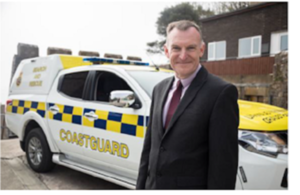MCA is shortlisted for an international award
The MCA has been shortlisted for the International Maritime Rescue Federation (IMRF) Awards 2019.

The International Maritime Rescue Federation (IMRF) awards is a scheme which recognises excellence in international rescue operations and services around the world.
The IMRF awards scheme is now in its fourth year and the MCA is shortlisted for the top award in the innovation and technology category which is for the development of an innovative process, technology or piece of equipment that contributes to saving lives in search and rescue (SAR) operations.
The ceremony at which the winners will be announced takes place on 10 September on board the HQS Wellington in central London as part of London International Shipping Week.
Up for the award is the MCA’s multi-faceted pathfinder projects to explore the use of remotely operated vehicles in SAR operations. HM Coastguard has a wide range of assets and technologies which are used in delivery of functions such as search and rescue helicopters, satellite imaging and detection, radar, search planning software. Drones and new technologies can offer new ways of finding people missing in remote areas.
Phillip Hanson, technical assurance manager for HM Coastguard has led this multi-faceted approach, conducting extensive trials, with industry involvement, to expose weaknesses in both the platforms and their operations, which has led to more innovative solutions using emerging technologies.
Trials with the Coastguard/RNLI and industry used a range of drones (both rotary and fixed wing) and sensor types in realistic search and rescue (SAR) scenarios. The search data was then shared with Qinetiq and the coastguard to direct operations on the ground.
A 12-month trial used a range of drone types and multi-agency support, including ground teams, lifeboats and aircraft, which extended the understanding of drone capability and limitations.
This, in turn, has helped in the development of operational protocols and the application of innovative technologies.
A further trial explored the detection of GPS-enabled mobile phones from SAR aircraft, working with RNLI and mountain rescue teams, to search and locate missing persons.
Maritime surveillance capabilities have also been developed for SAR and counter pollution services to help protect the wider marine environment.
This work has significantly advanced the understanding and establishment of concepts and pathways for the use of remote assets to improve the probability of detection and, ultimately, save more lives.